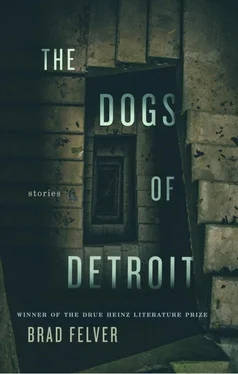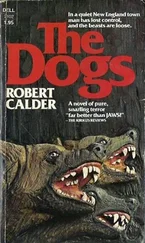Brad Felver
THE DOGS OF DETROIT
[stories]
Many years later, knots of grief cinched intractably within her, Ruth still urged her memory back to their first evening together: drinks at a posh restaurant on the shores of Lake Erie, how Gus offered to pay long before the bartender even noticed them, how he spoke so earnestly of dovetail joints. He wore a flannel shirt and carpenter’s jeans with fabric gone thin at the knees. He was wiry as a cornstalk and always would be. That night he spoke of how he wanted to make desks. “Desks!” he said, smiling as if he knew how absurd it sounded. For now he had his union card and worked what jobs came his way.
Ruth was working on her Ph.D. in applied mathematics at Case Western, studying stochastics. She spoke at length about her research, which involved probability theory, random variables, and chaotic systems. Gus listened with genuine interest, and when she finally paused to say, “Does that make sense?” he admitted that he wasn’t a graduate student, wasn’t a student at all, had in fact never been to a college campus. “I doubt I can even spell stochastic,” he said, “but I love listening to you talk about it.” The only fancy bit of math he knew was about Euclidean planes requiring three points, and this only because he felt strongly that all desks—all tables of any kind—should have only three legs. Two legs could not balance a load, but four created wobbles. Three created a perfect Euclidean plane.
His knowledge seemed so practical compared to her own—how to fix squeaky floorboards, what made a diesel engine different, why oak leaves fell later in the season than maple leaves. She had never met anyone like him at Case or back home in Boston. He was wholly without pretension, frequently offered remarkable compliments, but quickly grew embarrassed when similar compliments were returned. Even that name of his, Gus, seemed clipped short, as if his mother and father considered extra syllables an extravagance.
When the bartender did finally bring the check, Gus reached for his wallet and realized he didn’t have nearly enough money. Who had ever heard of $6 bottles of beer? Cold shame spread over him, and he knew immediately that such a gaff would quash the small, snug world they had built during their evening together. But Ruth thought little of it, pulling out a wad of cash while Gus went quiet like a penitent little Catholic boy, which of course he was. What Ruth never told him—never told anyone—was that it was his mortification over such a trifle, so utterly sincere, that made her love him immediately.
He visited her family before she visited his. Theirs was a three-and-a-half-story house of deep maroon brick and cream trim in Beacon Hill and boasted a view of Boston Common. The sidewalks were of cockeyed brick, framed by cobblestones, and the shrubs were manicured into perfect moons.
They sat on a back veranda and ate eggs Florentine. Gus never did see the kitchen or who had prepared the meal. Her father flinched when they shook hands—just a small twitch, barely perceptible—and only later did Gus realize this was because he was a vascular surgeon of some note, ever afraid of rough calluses and strong grips. Her mother had tight gray hair and picked at her food with a single tine of her fork. Gus felt her eyes that morning as he reached for what was almost certainly the improper cutlery.
After brunch, the men separated from the women in a way that felt mannered and Edwardian. Gus stood next to her father on the front stoop and drank down a glass of coconut rum. They watched dog walkers wander the Common. His eyes cruised around all the sights. He had never been so far east, had never experienced the extravagance of an old city. For a long while they didn’t speak, and he felt as if he was being tested. Who could maintain the silence longer? Eventually, her father said, “Desks.” He nodded ever so slightly. “Is that a growth industry?” It wasn’t entirely clear what the suggestion was. Was he afraid he would have to support them himself if they got married? Embarrassed that his daughter was dating a man who owned more than one hammer? Or was this just the easy contempt that New Englanders reserve for midwesterners?
“They didn’t know what to make of you,” Ruth said on the drive back to Cleveland.
“Unfortunately, I think they knew exactly what to make of me.”
“Well,” she said, “that’s their problem.”
Ruth wanted arguments to resolve things, but Gus just needed them to end as soon as possible.
“Stop apologizing,” she would say. “You’re allowed to disagree.”
“But I’m sorry. I hate this.”
“If you want to sit in a booth instead of a table, you have to say so.”
“I don’t have an opinion. You choose.”
“You need to have more opinions.”
“About tables and booths?”
So Ruth would always win the fights, which was somehow worse than losing them. He made her feel spoiled, not by anything he did or said but because she was and he wasn’t. She had never realized it before then. It made her feel cold, like a bully.
Gus’s father lived at the end of a long lane in Medina County. Charming Ohio farm country. Ruth searched the cabinets until she found the hand mixer and started making her special pepper biscuit recipe. She chided his father for eating with a napkin tucked into his shirt but in a way that felt playful, like some ancestral joke that ranged back over the decades.
His mother had been dead long enough that they didn’t think to explain what had happened. It was clear enough that they both liked having a woman in the house again.
“A doctorate,” his father said, shaking his head. “Must be a lot of work.”
“I guess I’ve always known I would have to do it,” Ruth said. She then drank off the last bit of her coffee and stared out the window at the flat green fields.
Later, while Gus hand-washed the dishes, Ruth sat at the table with his father. “That sounds like some house you have there in Boston,” he said. They hadn’t been speaking of home or her family. It was obvious how close Gus was to his father.
“It’s so lovely here,” Ruth said. “The quiet, I guess I mean. And there’s something about always being able to see the horizon that’s comforting.”
That afternoon, Gus walked her the length of the property, down long fencerows where he showed her how to scare up rabbits from their dens until she told him to stop being mean. She wanted to pet a chicken but lost her nerve at the last instant. They tried to reach around the ancient bur oak in the barnyard, the largest tree she had ever seen, but even together their arms were swallowed up by its girth. “We call her Queen Elizabeth,” he said, explaining that the tree was roughly the same age as Shakespeare. She had always thought New England was old. Such grandeur, she thought, and such different grandeur than what she was accustomed to. How could something be so regal and so unassuming at the same time?
He led her through the outbuildings full of equipment. Where the wood siding met the ground it had mostly shriveled up with rot. Finally he guided her into the workshop, where she quizzed him on what each tool did, and he explained it to her, carefully and without a trace of smugness. The planer and the table saw and the jointer—they had all been his grandfather’s, had been made in Germany. Nothing even approached their quality anymore. She pulled open drawers and fingered drill bits and awls and rasps. “There’s a tool for everything,” he told her, “and most of them are good for only one very specific thing.”
“This will all be yours one day,” she said, and he said, “Not soon, I hope.”
Читать дальше












